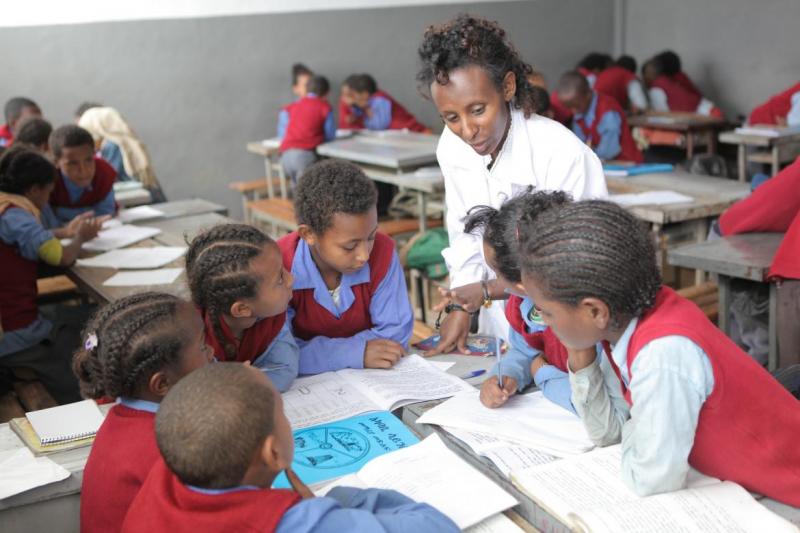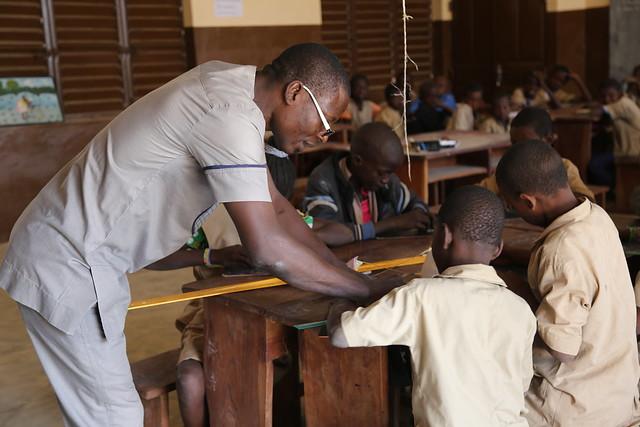
Without data on whether and how students are learning, it is impossible to ensure quality education. With the drive for education of quality front and center of the Education 2030 agenda, the issue of learning assessment is an increasing priority for developing countries and the partners that support them.
Despite a proliferation of assessments in many countries, including national examinations, sample-based assessments and the everyday classroom assessment practices deployed by teachers, developing countries face challenges in ensuring that assessment data effectively informs policy and practice.
This is why strengthening learning assessment systems is a priority area for GPE’s Knowledge and Innovation Exchange (KIX).
GPE grants incentivize better assessments
Partner countries applying for an implementation grant must have a system or mechanism to monitor learning outcomes, a time-bound plan to develop one, or else use the GPE grant to build one.
As a result, 88% of the 34 implementation grants active at the end of fiscal year 2018 invested in learning assessment activities. For example:
- Bhutan is supporting the development of a national assessment framework.
- Chad is participating in the regional PASEC assessment.
- The Democratic Republic of Congo is establishing an independent agency in charge of national assessments.
In addition, GPE’s Assessment for Learning (A4L) initiative works to reinforce these efforts through interventions at global and regional levels.
GPE’s results framework tracks learning assessments
GPE also monitors the quality of learning assessment systems through Indicator 15 of its Results Framework, which examines the proportion of partner countries with learning assessment systems meeting quality standards within the basic education cycle.
While 48% of countries met the threshold in 2018, challenges persist in most of the countries that GPE supports.
These challenges include the variable quality of assessment tools and lack of assessment expertise within the systems, the lack of alignment across various types of assessments and their coherence with the broader education system.
In addition, assessments often omit the most marginalized children, such as those with disabilities or who are not in school. There is also a general culture of underuse of learning assessment data.
These challenges are echoed in the synthesis of GPE’s ongoing country-level evaluations, which notes that while the countries examined are working to establish quality learning assessment systems, these efforts are often sporadic, resulting in an absence of comparable data over time and shifting levels of capacity within their respective Ministries.
Available public goods to improve learning assessment and gaps
A range of global public goods exist to support countries to build and reinforce their learning assessment systems. They include large-scale assessments and the tools and studies, data, networks and knowledge sharing opportunities they generate.
Capacity development initiatives are also available, with tools and publications, system capacity frameworks, networks and knowledge sharing platforms.
Innovation has been the focus of some global goods, including tools to promote international comparability and research on topics such as how data from large-scale assessments are used and how countries can assess a broad range of skills and competencies.
Supported by these initiatives, GPE partner countries are increasingly applying different learning assessments in their contexts. They participate in regional or international assessments and conduct national large-scale assessments with increasing frequency and institutional anchoring. Nonetheless, gaps remain for which additional support is needed.
In consultations undertaken to inform the KIX discussion paper, partner country officials noted that they need support in building a culture of evaluation and guidance in supporting teachers to conduct classroom-based assessments and in reforming examination systems.
Building strong institutions to oversee the portfolio of national assessment was also noted, while international actors weighed in strongly on the need for globally comparable data on learning outcomes.
KIX focuses on strengthening learning assessment systems
The KIX discussion paper maps challenges and existing global public goods, and highlights gaps and opportunities. It details four main opportunities that KIX can address:
- national learning assessment institutions
- building of expertise in learning assessment throughout the education system, from teachers to senior government officials
- learning assessment systems for the most marginalized
- systemic use of learning assessment data
 Teacher Léandre Benon and his students in class at The Akoitchaou primary school, located near Kandi, in the north of Benin. December 2018.PME/Chantal Rigaud
Teacher Léandre Benon and his students in class at The Akoitchaou primary school, located near Kandi, in the north of Benin. December 2018.PME/Chantal Rigaud
Support to national learning assessment institutions
Though countries have different institutional arrangements for learning assessments, capacity building and peer learning opportunities to support the development of national assessment frameworks are needed.
Supporting national learning assessment institutions may also include the development or expansion of diagnostic tools or review of public examinations reform or initiatives around competency-based assessment.
From an innovation angle, this support may explore the development of assessments that can capture a range of skills and competencies, beyond literacy and numeracy.
Building expertise in learning assessment throughout the education system
Recognizing that the learning assessment ecosystem involves actors from school to central level, capacity building is needed for all these actors, including for teachers to effectively conduct classroom-based assessment.
Further evidence is also needed on good practices in classroom-based assessment, as well as an understanding of how to build expertise in learning assessment in a cost-efficient and sustainable manner.
Supporting learning assessment systems for the most marginalized
Learning assessment systems are often absent or nascent in marginalized settings, such as those found in countries affected by fragility and conflict, while they are also inadequate in regard to marginalized learners, such as those with disabilities or out of school.
As such, KIX could support research on what works in such contexts or the participation of these countries in cross-national assessments. Innovation could also be harnessed to produce solutions to the challenge of collecting learning data for marginalized populations or in crisis settings.
Supporting the systemic use of learning assessment data
Given that one of the biggest challenges is ensuring that learning assessment data are used, we need more knowledge and exchange around this issue, emphasizing learning from good practices.
There may also be scope to think about new ways to support the dissemination, communication and visualization of assessment data or to consider pilots that can support a test-intervene-retest model.
Proposals for the KIX global call must be received by October 1st, followed by regional grant proposals in April/May 2020.
GPE hopes to support a diverse portfolio of activities, encompassing development of national capacity, building evidence and evaluation and innovation. Together, these interventions will accompany developing countries in being able to better monitor and improve their students’ learning.
Additionally, the KIX Regional Hubs will provide a valuable opportunity for countries to learn from each other on innovative approaches and strengthen their learning assessment systems.
This blog draws from the KIX SLAS paper, written by Kate Anderson.
---------------------------
Read the other blogs in this series:
